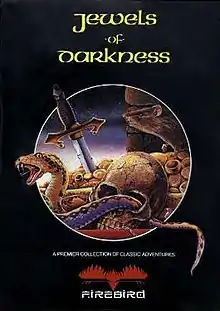Jewels of Darkness
Jewels of Darkness is a trilogy of text adventure games by Level 9. The individual games were initially released separately in 1982. They featured some themes and names inspired by the books of J. R. R. Tolkien and so became known as the Middle-Earth Trilogy. The individual releases were available for the BBC Micro unlike the compilation.
| Jewels of Darkness | |
|---|---|
 MS-DOS cover art | |
| Developer(s) | Level 9 |
| Publisher(s) | Telecomsoft |
| Platform(s) | Amiga, Amstrad CPC, Amstrad PCW, Atari 8-bit, Atari ST, Commodore 64, Macintosh, MS-DOS, MSX, ZX Spectrum |
| Release | 1986 |
| Genre(s) | Interactive fiction |
| Mode(s) | Single-player |
In 1986 the three games were revised, expanded and rereleased together as a compilation. For legal reasons the references to Middle Earth were removed and the trilogy was retitled Jewels of Darkness. The games include simple static graphics.
The games
Colossal Adventure
An expanded version of the original Adventure by Will Crowther and Don Woods
Adventure Quest
Similar in structure to the previous game, the player must defeat the Dark Lord, Agaliarept.
Dungeon Adventure
A continuation of the previous game; following the defeat of the Dark Lord, Agaliarept, the player must explore his dungeon looking for treasure.
Reception
| Publication | Score |
|---|---|
| Zzap! | 92%[1] |
Computer Gaming World stated that the compilation's claim that the games had been "significantly revised to incorporate the latest innovative techniques" was false. It described the puzzles as illogical, the Commodore version's graphics as "crude", and, like the parser, below the standard of previous Firebird text adventures.[2]
"[The graphics are] colourful but they're not great works of art. And the location descriptions and scenarios have always struck me as being good enough on their own."
Zzap! issue sept. 1986[1]
References
- Jewels of Darkness review in Zzap! issue 17, sept. 1986, p. 74, ISSN 0954-867X here
- Seacat, Douglas (February 1988). "Jewels of Darkness". Computer Gaming World. No. 44. pp. 23, 26. Retrieved 24 April 2016.
External links
- Jewels of Darkness at SpectrumComputing.co.uk
- Jewels of Darkness on the Amiga at the Hall of Light
- Jewels of Darkness at Lemon 64
- Jewels of Darkness at Lemon Amiga
- Jewels of Darkness at The Level 9 Memorial
- Jewels of Darkness at The Bird Sanctuary
- Images of Commodore 64 version of Colossal Adventure box and manual at C64Sets.com